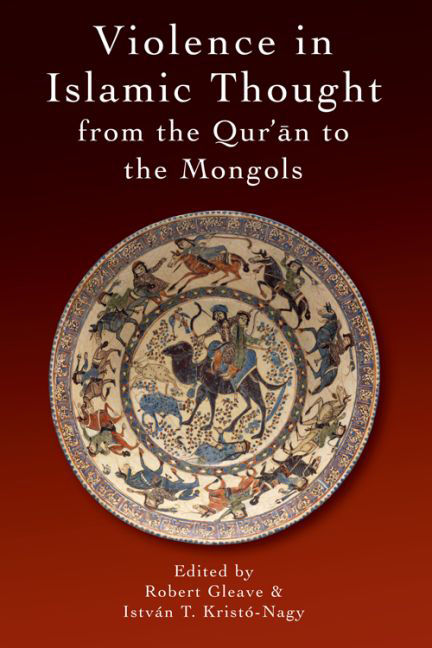Book contents
- Frontmatter
- Contents
- Dates and Abbreviations
- List of Figures and Tables
- 1 INTRODUCTION
- PART I JIHĀD AND CONQUEST: ATTITUDES TO VIOLENCE AGAINST THE EXTERNAL ENEMIES OF THE MUSLIM COMMUNITY
- PART II THE CHALLENGED ESTABLISHMENT: ATTITUDES TO VIOLENCE AGAINST THE STATE AND IN ITS DEFENCE WITHIN THE MUSLIM COMMUNITY
- 6 WHO INSTIGATED VIOLENCE: A REBELLING DEVIL OR A VENGEFUL GOD?
- 7 ATTITUDES TO THE USE OF FIRE IN EXECUTIONS IN LATE ANTIQUITY AND EARLY ISLAM: THE BURNING OF HERETICS AND REBELS IN LATE UMAYYAD IRAQ
- 8 ABBĀSID STATE VIOLENCE AND THE EXECUTION OF IBN ĀISHA
- 9 THE SULTAN AND THE DEFIANT PRINCE IN HUNTING COMPETITION: QUESTIONS OF LEGITIMACY IN HUNTING EPISODES OF ṬABARISTĀN
- PART III LUST AND FLESH: ATTITUDES TO VIOLENCE AGAINST THE DEFENCELESS, INTRA-COMMUNITARIAN VIOLENCE BY NON-STATE ACTORS
- Bibliography
- Index of Qurānic Citations
- General Index
8 - ABBĀSID STATE VIOLENCE AND THE EXECUTION OF IBN ĀISHA
from PART II - THE CHALLENGED ESTABLISHMENT: ATTITUDES TO VIOLENCE AGAINST THE STATE AND IN ITS DEFENCE WITHIN THE MUSLIM COMMUNITY
Published online by Cambridge University Press: 15 September 2017
- Frontmatter
- Contents
- Dates and Abbreviations
- List of Figures and Tables
- 1 INTRODUCTION
- PART I JIHĀD AND CONQUEST: ATTITUDES TO VIOLENCE AGAINST THE EXTERNAL ENEMIES OF THE MUSLIM COMMUNITY
- PART II THE CHALLENGED ESTABLISHMENT: ATTITUDES TO VIOLENCE AGAINST THE STATE AND IN ITS DEFENCE WITHIN THE MUSLIM COMMUNITY
- 6 WHO INSTIGATED VIOLENCE: A REBELLING DEVIL OR A VENGEFUL GOD?
- 7 ATTITUDES TO THE USE OF FIRE IN EXECUTIONS IN LATE ANTIQUITY AND EARLY ISLAM: THE BURNING OF HERETICS AND REBELS IN LATE UMAYYAD IRAQ
- 8 ABBĀSID STATE VIOLENCE AND THE EXECUTION OF IBN ĀISHA
- 9 THE SULTAN AND THE DEFIANT PRINCE IN HUNTING COMPETITION: QUESTIONS OF LEGITIMACY IN HUNTING EPISODES OF ṬABARISTĀN
- PART III LUST AND FLESH: ATTITUDES TO VIOLENCE AGAINST THE DEFENCELESS, INTRA-COMMUNITARIAN VIOLENCE BY NON-STATE ACTORS
- Bibliography
- Index of Qurānic Citations
- General Index
Summary
In what follows, an otherwise obscure incident in Islamic history – the execution of a leading member of the Abbāsid family by an Abbāsid caliph in the third AH/ninth AD century – is discussed to explicate the bounds of what can be considered ‘legitimate state violence’ at the time. The execution and the manner in which the caliph carried it out were intended to serve as a warning for a recalcitrant wing of his Abbāsid family – the pro-al-Amīn faction. In the long run, however, the episode would have repercussions for Islamic history, and this pro-al-Amīn faction (which included the executed Abbāsid) ultimately won the day after al-Mutaṣim was appointed caliph, rather than a son or other progeny of al-Mamūn – the caliph in question, who executed the Abbāsid.
This article first recounts the background and circumstances surrounding the arrest and execution of Ibn Āisha – a not very well-known member of the ruling Abbāsid family. Following this, I will undertake an analysis of how al-Mamūn, the Abbāsid caliph who executed Ibn Āisha, conceptualised the institution of the caliphate and the role of its incumbent, the caliph. The narrative ends by relating Ibn Āisha's execution to al-Mamūn's political reasoning, delineating this caliph's understanding of what constituted legitimate state violence.
THE CIVIL WAR BETWEEN THE BROTHERS AL-AMĪN AND AL-MAMŪN
As most readers will recall, al-Mamūn was the seventh Abbāsid caliph, who ruled from 198–218 AH/813–33 AD. He came to power after a civil war with his brother, al-Amīn (r. 193–8/809–13). This conflict was the result of the implementation of succession plans dictated by their father, Hārūn al-Rashīd (r. 170– 93/786–809). These stipulations came to be known as the Meccan or Kaba Accords. The exact circumstances which led to the Meccan Accords and even their wording remain one of the great unresolved mysteries of Abbāsid history: in these accords, the six-month younger al-Amīn, an Abbāsid on both father's and mother's side, was made heir to the caliphate to be followed by his older brother al-Mamūn, who, in turn, was to be succeeded by another, otherwise unknown, brother, al-Qāsim. At any rate, most sources stress one element: Al-Amīn, unlike al-Mamūn, was an Abbāsid on both sides: his father was Hārūn al-Rashīd and his mother was Zubayda, a granddaughter of the second Abbāsid caliph al-Manṣūr (r. 136–58/754–75).
- Type
- Chapter
- Information
- Violence in Islamic Thought from the Qur'an to the Mongols , pp. 128 - 140Publisher: Edinburgh University PressPrint publication year: 2015

